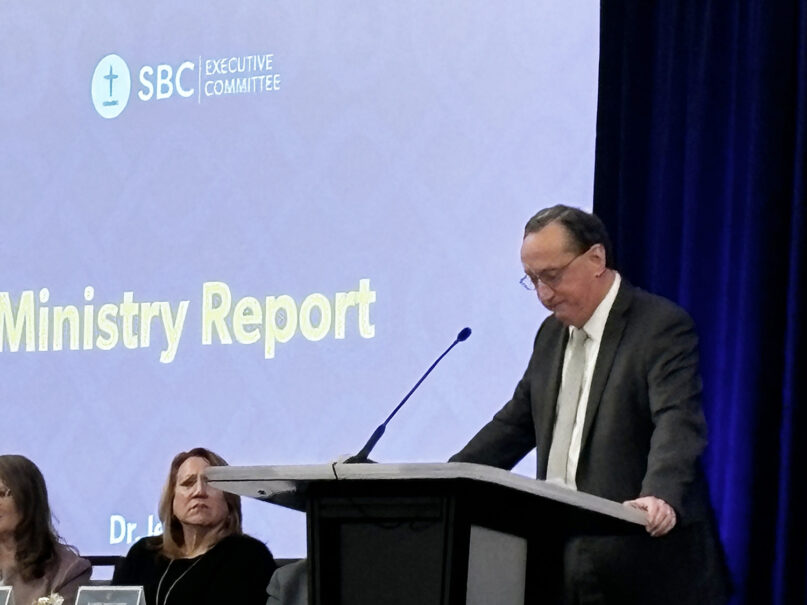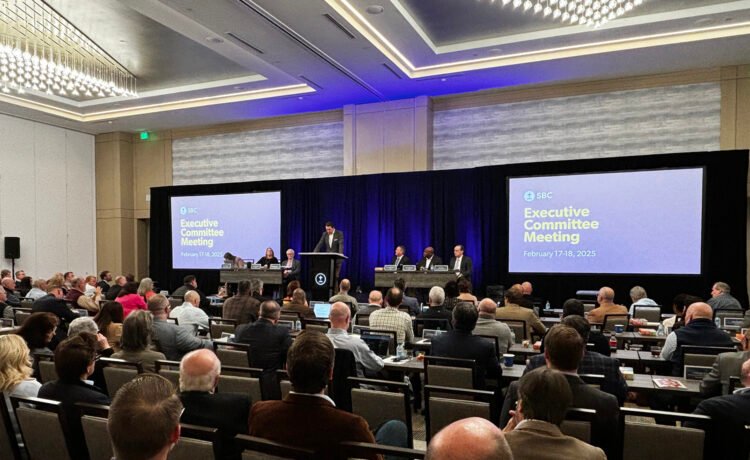NASHVILLE, Tenn. (RNS) — Leaders of the Southern Baptist Convention’s Executive Committee struck a hopeful and defiant tone on Monday night (Feb. 17), acknowledging the fiscal woes facing the convention yet insisting the nation’s largest Protestant denomination remains a force for good in the world.
“Some critics persistently claim we are corrupt, and the entire Southern Baptist enterprise needs to be dismantled,” Executive Committee President Jeff Iorg told committee members in an impassioned speech. “They are wrong.”
The denomination would not fail on his watch, Iorg added, saying he hopes the SBC’s thousands of pastors feel the same way.
Iorg, a former seminary president, had been on his way to retirement last year before accepting the role of president of the Executive Committee. Convention leaders hope his tenure will bring an end to several years of instability and conflict for the Nashville-based committee, which manages the denomination’s business in between the SBC’s annual June gatherings.
When he was elected president, Iorg became the first permanent leader since 2021 and its third since 2018. His predecessor, Ronnie Floyd, resigned in October 2021 after a two-year tenure marked by the SBC’s sexual abuse crisis. Floyd’s predecessor, Frank Page, stepped down in 2018 for misconduct. An interim leader that followed Floyd also resigned after admitting he falsified his resume.
During Iorg’s speech, held in a meeting room at a Nashville airport hotel, he said the committee’s staff had begun to make progress in addressing abuse by hiring Jeff Dalrymple as a national director to oversee several proposed reforms. Iorg also outlined five steps the committee planned to take to implement the abuse reforms, including strengthening training materials and working more closely with the denomination’s state conventions to address abuse.
The abuse reforms, including a database to track abusive pastors, have largely stalled over the past three years — in part because there was no permanent funding and because implementing reforms had been left in the hands of a volunteer task force. Last year, the SBC’s annual meeting charged the Executive Committee with getting the reforms back on track. Iorg and Dalrymple are expected to meet with reporters to address the abuse reforms after the committee’s meetings on Tuesday.
Iorg said the committee’s plans for responding to abuse were shaped in part by the response to a hotline set up by the SBC in 2022 for reporting abuse claims. The hotline has received 1,008 contacts since then, said Iorg.
Two-thirds of those contacts – 674 in all — had to do with abuse. Of those, 41% dealt with alleged abuse of adults, while 59% were reports of alleged abuse of minors.
Iorg said those reports suggest sexual abuse is a serious issue for the SBC to deal with — but asserted it is not widespread.

Jeff Iorg, president of the Southern Baptist Convention’s Executive Committee, speaks during the committee’s annual meeting on Feb. 18, 2025, in Nashville, Tenn. RNS Photo by Bob Smietana
“Abuse is not frequently being reported in Southern Baptist churches,” Iorg said. “We have widely publicized this issue for the past five years and encouraged people to come forward with information and allegations. We now have verified, third-party data.”
Iorg did at that the hotline call data was not a comprehensive look at the scope of abuse in the SBC and that more data was needed.
On Monday, Iorg also laid out the committee’s financial challenges — caused mainly by ongoing legal costs related to a 2021 investigation into abuse. A report from the investigation found that SBC leaders had downplayed the prevalence of abuse in the denomination and had mistreated abuse survivors who tried to raise the alarm. Two of the leaders named in that report for alleged abusive conduct are now suing the denomination. Legal costs from the investigation have totaled more than $13 million, Iorg told the committee, draining the committee’s reserves.
To defray those costs, the committee is marketing its Nashville office with a $35 million price tag — hoping to bring in an influx of cash. Leaders are also proposing to set aside $3 million in the SBC’s annual budget for legal fees, to be taken out of the SBC’s Cooperative Program, which raises funds for missionaries, seminaries, new church starts and other national ministries.
The proposal was approved by the committee Tuesday morning and now will be presented to church representatives, known as messengers, at the SBC’s annual meeting, set for this June in Dallas. Leaders would prefer to use Cooperative Program funds for missions and ministry, Iorg said.
But the denomination’s legal bills have come due — and more will likely accrue in the future. The denomination’s churches approved the investigation, said Iorg, and the legal fees are part of the cost that came along with that decision.
“Here’s our present reality,” he said. “Decisions were made by the messengers in 2021. Those decisions have consequences. Those consequences have costs and those bills are due and they must be paid.”
Iorg said he believed the SBC’s churches would step up to pay those bills and would rally together to set up the denomination to focus on its mission in the future. His comments, which were greeted with a standing ovation, came on the heels of a rousing speech by SBC President and North Carolina pastor Clint Pressley, who was elected last year. Pressley urged his fellow leaders to celebrate the good things the denomination does — and to work together to address the denomination’s challenges.
In particular, he pointed to the denomination’s Cooperative Program, which turns 100 this year. That program — which raises hundreds of millions of dollars every year from local churches – was beset by troubles in its early years, which coincided with the Great Depression and were marked by two major embezzling scandals in the late 1920s. Rather than giving up, Pressley said, Baptists faced their problems head-on and made things better. He called on the committee members and other SBC leaders, including heads of the SBC’s missions boards, seminaries and other entities, to do the same.
“Leaders don’t panic,” he said. “But they do act.”















